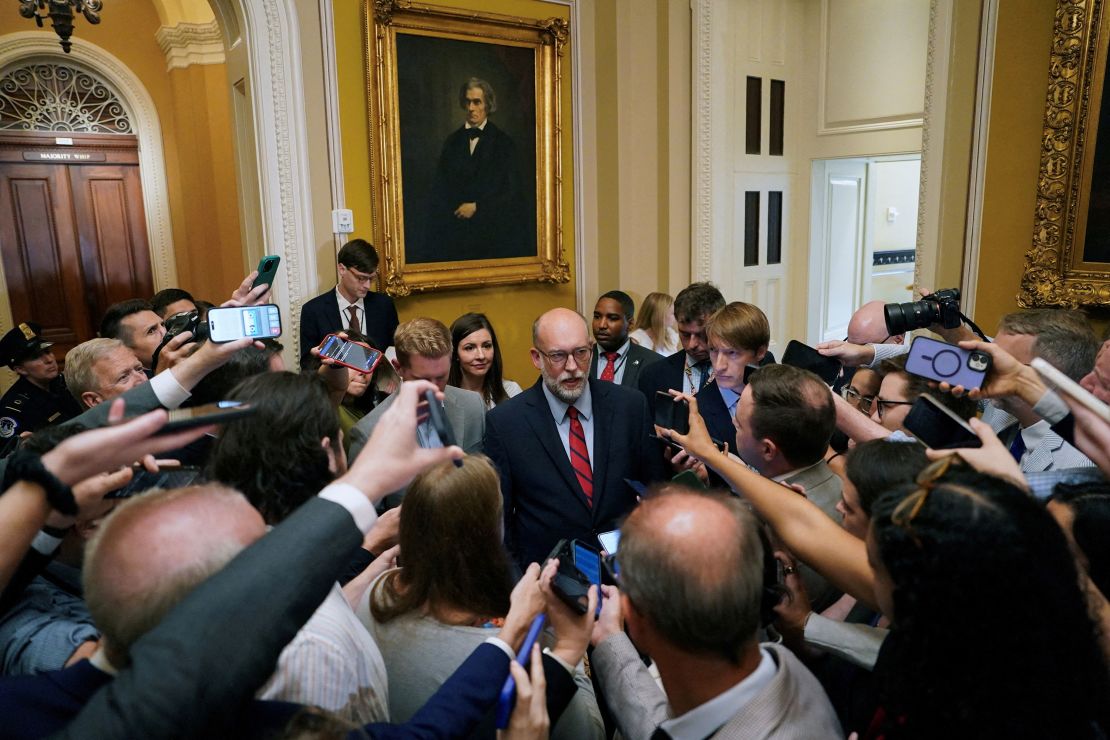CNN
—
The Senate narrowly cleared two procedural hurdles Tuesday to move closer to a final vote on the GOP effort to codify Department of Government Efficiency spending cuts as a deadline to act on the White House priority looms.
The package to claw back billions in federal funds Congress already approved for foreign aid and public broadcasting programs must pass the Senate and the House by Friday, under an obscure presidential budget law used to circumvent the filibuster. It got a boost when Senate Republicans appeared to have resolved sticking points related to a key global health initiative and rural radio access.
Three GOP senators joined Democrats in voting against advancing the package: top Senate appropriator Sen. Susan Collins of Maine, former Senate GOP Leader Mitch McConnell, and Sen. Lisa Murkowski of Alaska. The final tally for both votes was 51-50, with Vice President JD Vance casting the tie breaking votes.
The Senate is set to reconvene Wednesday morning for debate on the bill before proceeding to a marathon voting session on amendments, expected to start in the afternoon, followed by a final vote. It’s not yet clear when a final vote will take place.
Earlier on Tuesday, Senate Majority Leader John Thune confirmed that a controversial cut of $400 million that senators believed would impact the President’s Emergency Plan for AIDS Relief, or PEPFAR, had been removed from the bill, known as a “rescission package.” With the change, the package clocks in at roughly $9 billion in cuts. The provision had faced criticism from a number of GOP holdouts.
“We’re fine with adjustments. This is still a great package,” White House Office of Management and Budget Director Russ Vought told reporters on Tuesday after meeting with GOP senators at a closed-door lunch.
The Senate, he added at the time, “has to work its will and we’ve appreciated the work along the way to get to a place where they think they’ve got the votes.”

Separately, Sen. Mike Rounds announced he would back the measure after working out an agreement that would keep funds flowing to rural radio stations in his state of South Dakota, an issue he’s been working for weeks to resolve.
Rounds said of his negotiations on X: “We wanted to make sure tribal broadcast services in South Dakota continued to operate which provide potentially lifesaving emergency alerts,” and said that he worked with the Trump administration to find “money that could be reallocated to continue grants to tribal radio stations without interruption.”
Rounds’ support came just hours before the pair of procedural votes to advance the bill. It’s always possible other Republicans could turn against the package in a final vote, but it appears poised to pass with a tie-breaking vote from the vice president.
Collins and Murkowski pointed to a lack of specific information from the administration on how the cuts could affect global health programs, and their opposition to broad cuts to public broadcasting, when explaining their votes.
Murkowski also argued that the rescissions package from the White House sets a harmful precedent undermining Congressional authority. “We’re lawmakers. We should be legislating. What we’re getting now is a direction from the White House and being told, ‘This is the priority. We want you to execute on it. We’ll be back with you with another round,’” she said. “I don’t accept that. I’m going to be voting no.”
The amendments during the upcoming marathon voting session must be “germane” to the bill. That means the universe of the kinds of amendments that can be offered is more limited than what you might see in a typical vote-a-rama. Still, the process will allow Republicans to make changes to the legislation and provide Democrats an opportunity to force their Republican colleagues to vote on politically difficult issues.
Since senators are planning to make changes to the bill, it is expected to have to return to the House for final passage – marking the second time this month the Senate GOP would be jamming the House on a Trump priority.
House Speaker Mike Johnson earlier in the day encouraged the Senate to send the package back to his chamber “as is” due to the House Republicans’ narrow majority. The Louisiana Republican said he’s urged the Senate “as I always do, to please keep the product unamended, because we have a narrow margin and we got to pass it.”
“We’re going to process whatever they send us, whenever they send us. I’m hopeful that it will be soon,” Johnson said at a news conference with House GOP leadership.
CNN’s Veronica Stracqaulursi, Maggie McCabe and Sarah Ferris contributed to this report.

